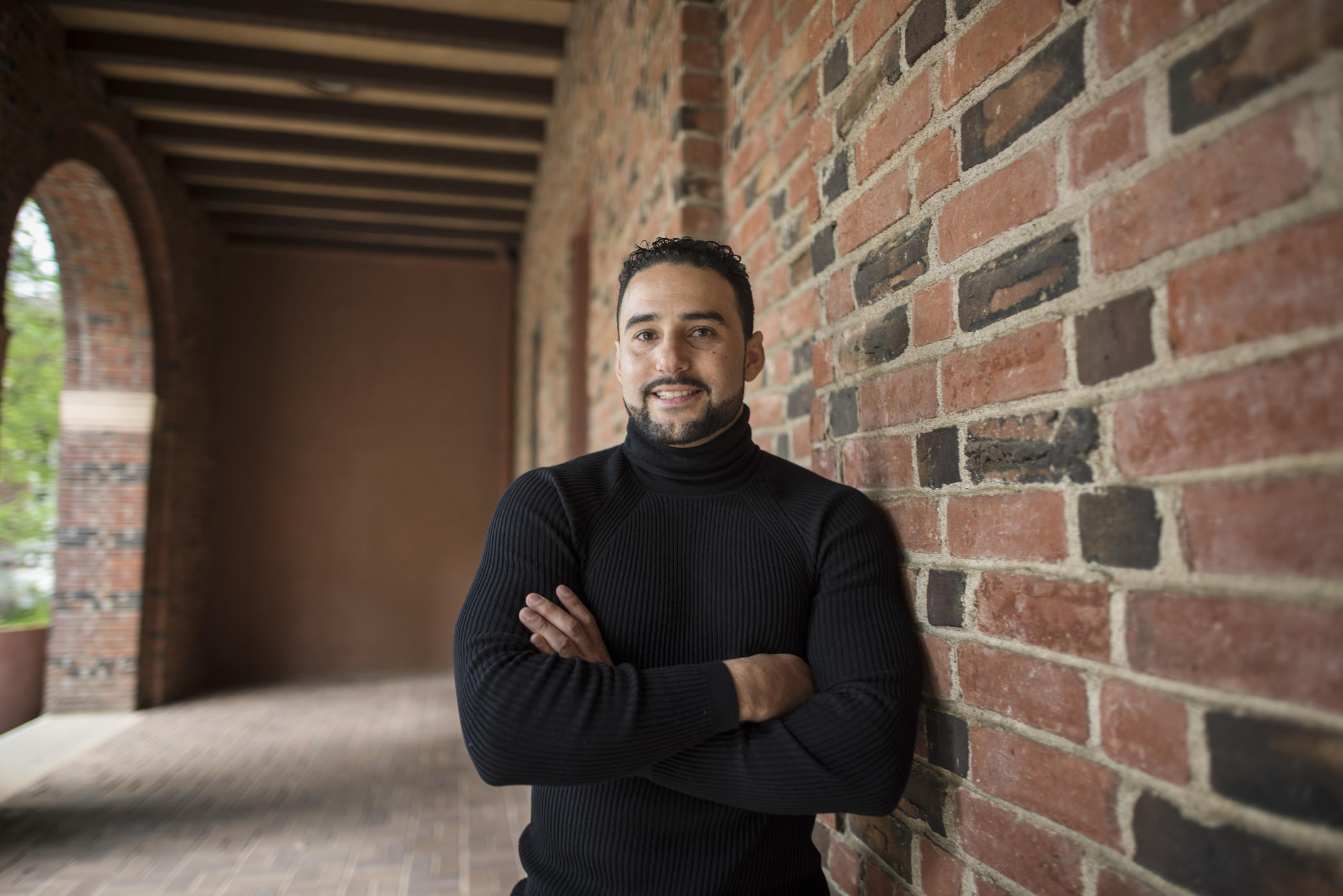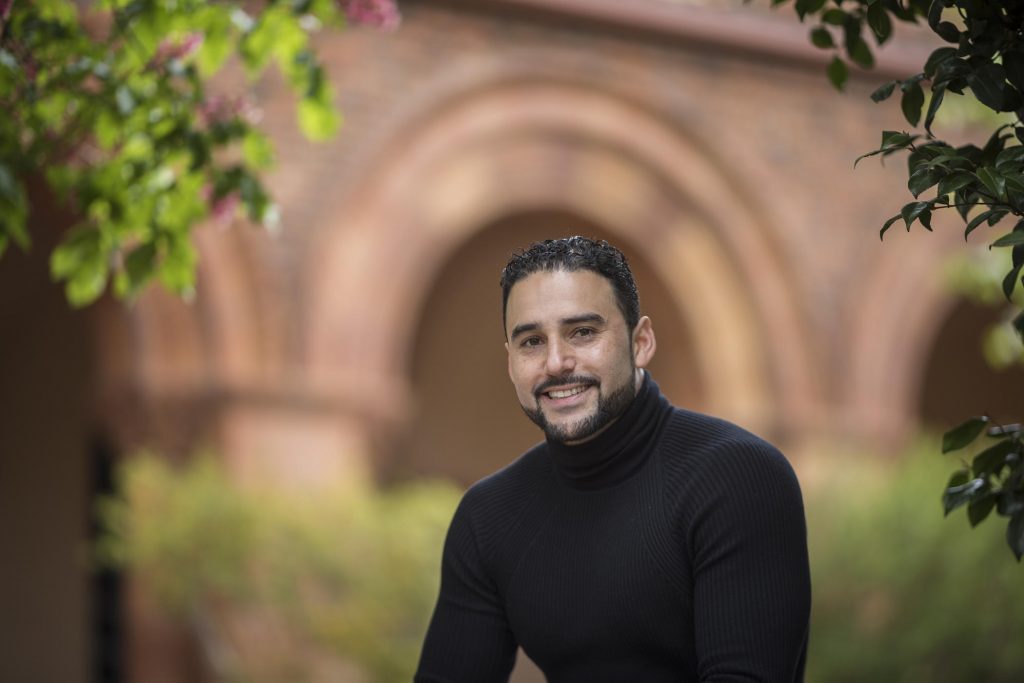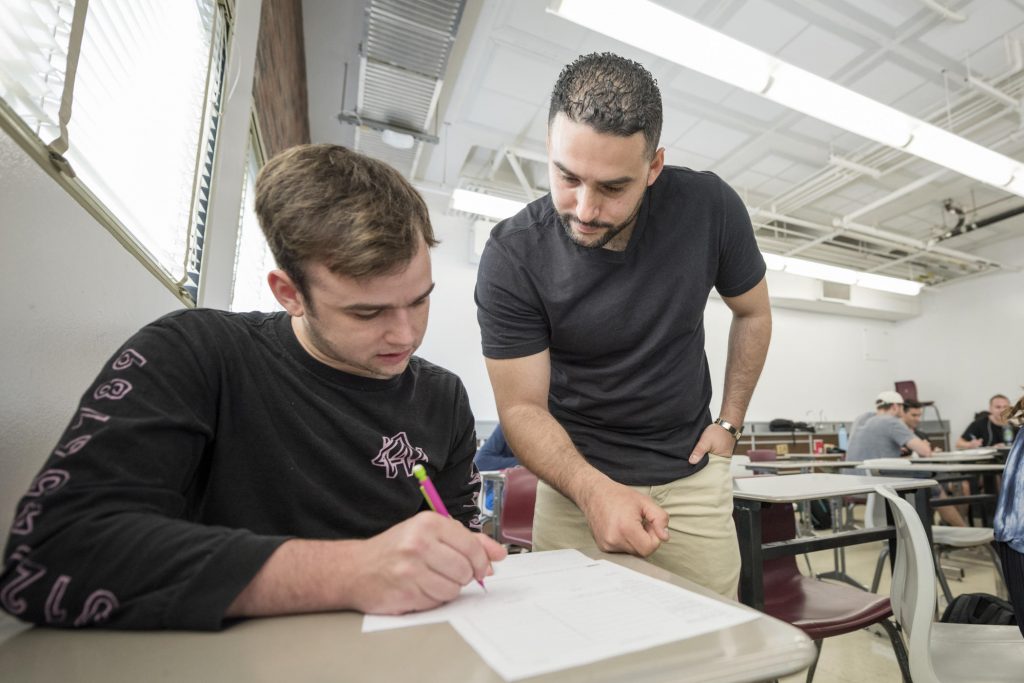Driven By Resilience and Tenacity, Triple Major Has His Day

Daniel Caravez, is a 31 year old, first-generation, mathematics education major, photographed on Monday, April 16, 2018 in Chico, Calif. His parents brought him to the United States from Mexico at the age of seven. When he first arrived to this country, he encountered several cultural differences. He began the third grade in an English-speaking class without being able to speak or understand English. He struggled with trying to understand what was being taught in school and trying to fit in, and be accepted by other students. He felt unwelcomed, left out, and rejected by others. He developed a passion for mathematics because they had the same significance in English and Spanish. He wants to be a math teacher. (Jason Halley/University Photographer/CSU Chico)
Daniel Caravez has almost always been split between worlds. When his family left Mexico, he arrived in the Bay Area as a third-grader who didn’t speak a word of English. He felt excluded, unwelcomed, and rejected by his classmates, struggling to understand the language and to fit in.
Then he discovered a shared language: math.
“It’s pretty much a language of its own, and if you speak it, you can understand it,” said Caravez. “When I came to this country, that’s how I was able to relate.”
As he gained English fluency, his passion for math continued to grow. While he attended the community college in the Bay Area, his parents moved to Corning, leaving the first-generation student hours away from his support system, without direction, and unprepared to navigate the unfamiliar higher education landscape alone. Feeling like he’d been left behind, he dropped out after a year and a half.
“I felt like I had no guidance in school whatsoever,” he said, “and I felt like I was just going through the motions.”

On his own for the first time, Caravez worked construction for a year and a half in Tracy, and eventually enrolled at Butte College, rejoining his family in the North State. After a semester, however, Caravez dropped out again, this time feeling pressure to help his parents financially.
He toiled in the orchards of the North State, enduring taxing 10-hour shifts in triple-digit heat six days a week digging ditches, planting walnut trees and trimming established trees beneath an unrelenting summer sun. It was 2011.
The 25-year-old Caravez was at a crossroads. He’d always enjoyed academics and had a passion for education. But he didn’t know what that meant for him yet, and Caravez is the type of person that must fully understand where his education will take him and what he can do with it. It’s an inherent, unshakable need to understand the path that lay before him.
Caravez’s parents had brought him and his two brothers from Mexico to the United States when he was seven years old, uprooting the family from the town of Aguililla for the prospect at a better future for the boys. The conditions in which they left Mexico “weren’t ideal,” according to Caravez, and they all obtained permanent residency in 2000.
Now, however, working brutal 60-hour weeks at minimum wage in the orchards doing something he didn’t like, Caravez was beginning to worry that he’d squandered an opportunity to define a better future.
“The person I drove to work with had kids, and sometimes he’d mention that he was working that hard for his kids to have a better future,” Caravez said. “I realized that my parents had done the same.”
He understood the right thing to do was to return to school.
He re-enrolled at Butte College, where he ignited his longstanding passion for math and realized he wanted to become a math teacher. In 2013, he earned three associates of arts degrees, and arrived at Chico State as a mathematics major. He picked up a Spanish education major thanks to his coursework at Butte, then added a third major, Latin American studies.
Caravez brought a tireless work ethic to not only his academics, but his life outside school, as well. While attending classes at Chico State, Caravez also worked full-time at the Walmart Distribution Center in Red Bluff to make ends meet. His three-day-a-week, 3:30 p.m. to 1 a.m. schedule never conflicted with his classes, but it sure made for some rough mornings when he had 8 a.m. classes.
Caravez also pocketed some early math-teaching experience when he tutored the fifth-grade son of his Latin American studies professor Sarah Anderson.
“He was so thoughtful with my son, who was struggling with math concepts,” Anderson said. “He went out of his way to make sure that my son felt comfortable in their sessions.”
Spurred on by a natural curiosity, Caravez dived deeper into the math coursework. He was driven to understand not only mathematical concepts, but also took the rare step of wanting to learn how to teach math to students who were like him as a child. He pondered how he could take his students’ backgrounds into account during the learning process to help them enjoy math as much as he did.
M.E. Matthews, one of Caravez’s math professors, said this approach set him apart from her other math students.
“He came into it ahead of the curve in that sense,” said Matthews. “He was already aware that it’s not just about how much you like math, but also where your students come from and how you’re getting them to enjoy the mathematical classroom experience.”
At one point, Caravez visited Matthews during her office hours, when she mentioned how excited she was for him to be a teacher and how much he had to offer. Caravez countered by telling her he was thinking of dropping his math major.
The grind of coursework for three majors and full-time employment were beginning to take a toll. He was enduring a painful divorce. And he was overwhelmed by how long it was going to take to fulfill his math major requirements.
The lofty heights and future accomplishments he once envisioned for himself were beginning to dissolve. Matthews reminded him of the astonishing potential she saw in him.
“At first, it was a lot of, ‘You’re going to be a great math teacher, we have to keep you here,’” she recalled.
They continued to visit throughout the semester, with Matthews investing time talking to Caravez about teaching and supporting his future students. She helped put his path into perspective.

“I also talked to him about how it was okay to struggle with math,” she recalled, “to take a breath and keep trying, and how his struggles would help him empathize and support his future students in their struggles.”
“He told me it was the first time he had felt someone in the [mathematics] department believed in him,” Matthews said.
“She was kind of like an angel dropped from heaven during my struggles,” Caravez said. “She kept me going.”
Reinvigorated, Caravez was ready to commit himself to fulfilling his personal promise to obtain three degrees. And he fully immersed himself into the educational experience. He spent a summer in Spain through Study Abroad. He served as vice president of Phi Sigma Iota—the international foreign language honor society—which provides tutoring in the community, including affiliation with Project Math and Upward Bound. He also became a learning assistant for the Department of Science Education, providing academic assistance to Chico State students. He was stepping into leadership roles in all three of his majors.
“When he works with other students that may not have the same Spanish skills or just aren’t the caliber of student he is, he doesn’t make them feel less,” Anderson said. “He wants to make sure that everyone’s on board, that they know what they’re doing and they’re going to be successful.”
In 2016, Caravez was named a recipient of the 35th annual Lieutenant Robert Merton Rawlins Merit Award, a prestigious honor that annually celebrates scholarship, extracurricular activities, and outstanding academic and professional accomplishments.
Caravez recently applied for the Residency in Secondary Education (RiSE) program at Chico State, where he hopes to earn his master’s degree and a teaching credential in mathematics.
While he may not have always known what his future held, Caravez now has his sights set firmly on his future. He wants to serve students in smaller North State populations where education may not be a top priority. He hopes to incorporate his experiences, background, and culture into his teaching.
“I’ve always enjoyed school, and even though it was tough for me at first, education opened doors for me,” he said, “You meet people, you get to learn from other people, you get to teach other people. I always knew that I had that love for education, it was just a matter of time before I got through it.”
Matthews feels that the rare combination of math skills and empathy will serve Caravez well in his goal to empower and uplift future math scholars.
“He is very aware where the students he wants to teach are coming from, both in their mathematical and personal backgrounds,” she said. “He’s really considering both of those things when thinking about being a teacher—and those are qualities of the best teachers.”


